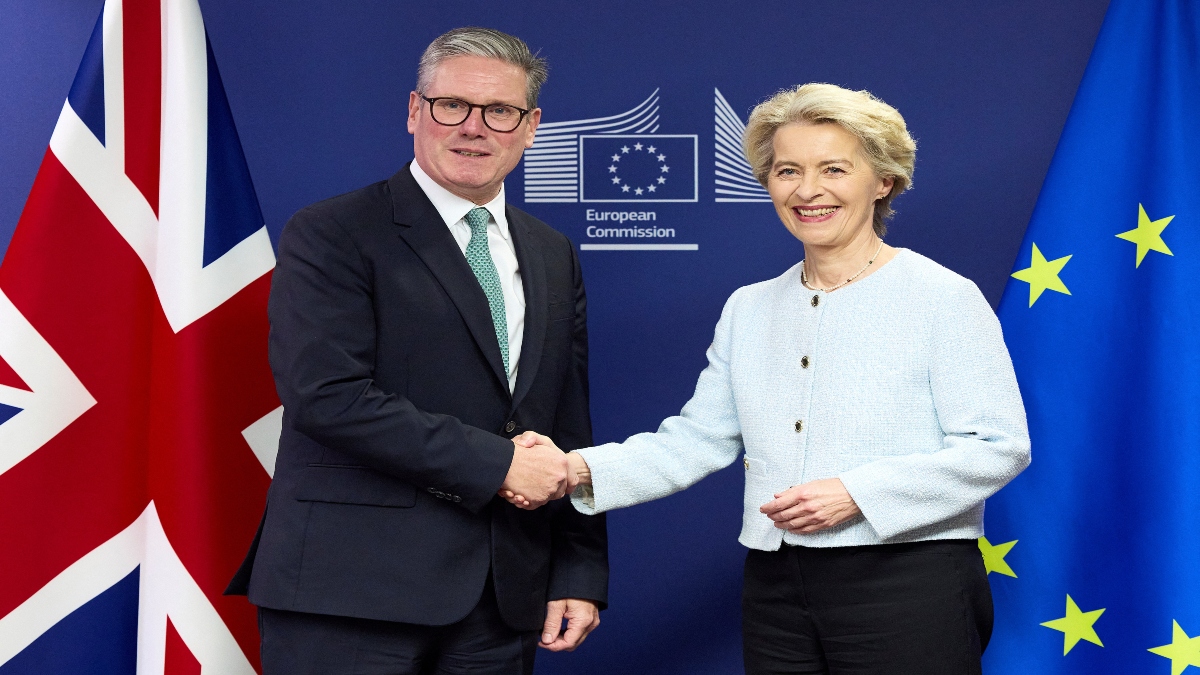Britain and the European Union on Monday reached a new defence and security agreement, marking a significant step in resetting relations between London and Brussels, nearly nine years after Britain voted to leave the bloc.
According to a Politico report, during a landmark summit in London, the UK and EU struck a broad agreement that includes extending generous fishing rights for EU fleets in British waters until 2038 — a significant concession by the UK following strong lobbying from France.
The two sides also committed to pursuing further agreements in key areas such as energy, agrifood regulations, climate policy, migration and policing cooperation, and the movement of people, added the report.
Negotiators worked late into the night on Sunday to strike the accord ahead of the London summit at Lancaster House.
President Donald Trump’s tariffs and his calls for Europe to strengthen its own defences prompted governments worldwide to reassess their trade, defence, and security strategies.
This shift has brought UK Prime Minister Keir Starmer closer to French President Emmanuel Macron and other European leaders.
Starmer, who supported remaining in the EU during the Brexit referendum, is also banking on delivering practical benefits — such as allowing Britons to use faster e-gates at EU airports —to counter criticism from Brexit advocates like Nigel Farage.
The UK government said this renewed relationship with its largest trading partner aims to cut red tape for food and agricultural producers, lower food costs, enhance energy security, and contribute nearly £9 billion ($12.1 billion) to the economy by 2040.
This marks the third major deal Britain has signed this month, following agreements with India and the United States. While the immediate economic impact may be limited, the move is expected to boost business confidence and attract vital investment.
“It’s time to look forward,” Reuters quoted Starmer as saying in a statement.
“To move on from the stale old debates and political fights to find common sense, practical solutions which get the best for the British people. We’re ready to work with partners if it means we can improve people’s lives here at home,” he added.
Impact Shorts
More ShortsThe security and defence pact establishes formal cooperation between the UK and the EU in key areas including hybrid warfare, cybersecurity, protection of critical infrastructure, and maritime safety.
On the defence front, the agreement paves the way for the UK to take part in joint EU defence procurement initiatives.
However, additional negotiations will be needed for Britain to gain access to the EU’s €150 billion SAFE rearmament programme, with financial contributions from London expected as a condition for participation.
In addition to the defence and security pact, the UK and EU have reached a “common understanding” outlining the areas where they aim to strengthen ties in the coming months.
These documents define the scope for future negotiations, which are expected to begin promptly across all identified topics.
According to the Politico report, one of the most ambitious elements is in the energy sector.
The UK has agreed, in principle, to effectively rejoin the EU’s single electricity market and align with EU regulations, under the oversight of the European Court of Justice — a move likely to provoke backlash from Eurosceptics in Britain, added the report.
European Commission President Ursula von der Leyen hinted at this plan during her visit to London last month, voicing concerns that the current post-Brexit energy arrangements were hindering green investment in the North Sea and pushing up electricity prices for consumers.
Similar negotiations are anticipated around sanitary and phytosanitary (SPS) standards, which could significantly ease border friction at Channel ports and the Northern Ireland crossing—facilitating smoother trade flows, reported Politico.
Progress on youth mobility remains uncertain.
One EU diplomat described it as a “work in progress,” noting it remains a priority for Brussels.
However, both sides have agreed to begin discussions on improving business mobility — a key demand from companies on both sides of the Channel. Talks will also commence on the UK potentially rejoining the Erasmus+ student exchange programme.
The UK government has expressed concern that participation in such schemes could lead to a rise in young EU nationals moving to Britain, complicating its efforts to reduce net migration.
As part of the new framework, UK Foreign Secretary David Lammy and EU High Representative Kaja Kallas will meet for biannual dialogue sessions, with additional regular discussions planned on key foreign policy issues, including Russia-Ukraine, hybrid threats, and the Western Balkans.
The agreement is expected to be formally endorsed by UK and EU leaders later on Monday during the London summit.
With inputs from agencies
)